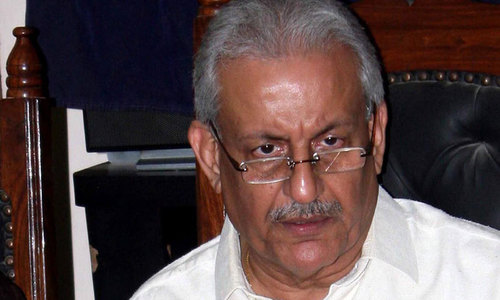ISLAMABAD: Pakistan Muslim League-Nawaz plans to pass long-delayed legislation against “honour killings” within weeks in the wake of the high-profile murder of outspoken social media star Qandeel Baloch, the daughter of Prime Minister Nawaz Sharif said on Wednesday.
The bill will go before a parliamentary committee as early as Thursday, said Maryam Nawaz Sharif, who is an increasingly influential member of her father's ruling party.
The government has faced mounting pressure to pass the law against murders carried out by people professing to be acting in defence of the honour of their family.
The law would remove a loophole that allows other family members to pardon a killer.
The brother of social media star Qandeel Baloch has been arrested in connection with her strangling death and told a news conference he was incensed by her often risque posts on social media.
Also read: Qandeel Baloch is dead because we hate women who don't conform
Some 500 women are killed each year in Pakistan at the hands of family members over perceived damage to “honour” that can involve eloping, fraternising with men or any other infraction against conservative values that govern women's modesty.
Maryam Nawaz said the government wanted to pass the law unanimously and had been negotiating with religious parties in parliament.
“We have finalised the draft law in the light of negotiations,” she told Reuters in an interview.
“The final draft will be presented to a committee of joint session of parliament on July 21 for consideration and approval.”
Maryam said once the parliamentary committee approved the bill, it would be presented for a vote in a “couple of weeks” before a joint session of parliament.
Know more: Isn’t Qandeel Baloch’s murder as ‘un-Islamic’ as Zeenat Bibi’s?
A spokesman for Jamaat-i-Islami, one of the two major religious parties in parliament, said his party would not oppose the bill.
The country’s other main religious political party, Jamiat Ulema-i-Islam, could not be reached for comment but it has only a small number of seats in parliament.
Both religious parties have traditionally opposed legislation empowering women.
The upper house of parliament passed the bill in 2015 but it lapsed after the government failed to put it up for a vote in the lower house because it was preoccupied with legislation aimed at tackling security problems and economic reforms.
A senior government official told Reuters all major parties were now backing the bill and it was likely to be passed in a few weeks by a joint session of parliament.
“The prime minister is taking personal interest,” added a second official and close aide to Sharif.
“You will see in coming days more will be done, big changes will be announced.”
In a rare move, this week the government became a complainant in the police case against Qandeel's brother accused of her murder, designating it a crime against the state and thereby blocking her family from forgiving their son.
Right to forgive
Qandeel had long divided opinion with her social media photos and posts.
She was unapologetic about pushing the boundaries of acceptability for women and changing “the typical orthodox mindset” of her audience.
Many viewed her as a disgrace to cultural values while others hailed her as a “feminist icon”.
She ran into political controversy last month after her “selfie” photographs with Mufti Qavi went viral, leading to him being fired from the Ruet-i-Hilal committee.
After her death, Mutfi Qavi told media that her murder should serve as an example for others who tried to malign the clergy.
Qavi is being investigated for her murder along with Qandeel's two brothers.
Although government officials appeared confident of backing for the bill in parliament, it could still face resistance.
The influential Council of Islamic Ideology, which advises the government on the compatibility of laws with Islam, warned that it would not support any law that removed the forgiveness loophole, even though the council considers honour killings a crime.
“Islamic law and the Quran say that the right to forgive or punish lies first and foremost with the victim's family,” said council spokesman Inam Ullah.
“So if this bill is trying to completely take away that right from the family, then of course that is against Islamic teachings. The state cannot completely take away that right from the family.”
The religious parties and the council hold significant influence over public opinion and the government fears a backlash if any law passes without their approval.
“This mentality — that you can get away with murder in the name of honour — it has to be done away with,” said Sharmeen Obaid-Chinoy, whose documentary on honour killings “A Girl in the River: The Price of Forgiveness” won an Oscar this year.
“I am hopeful that this law will pass but the change in mindset will talk so much longer... I think Qandeel Baloch's murder is the tipping point.”














































